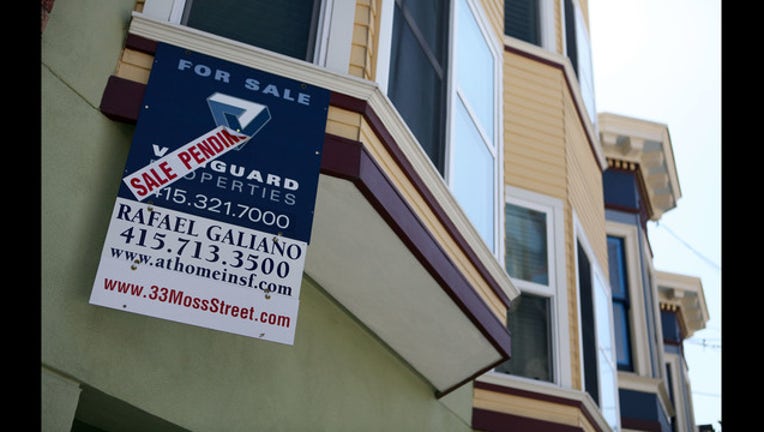California voters reject Prop. 10 rent control expansion measure

FILE -- A file photo of a San Francisco property with a sale pending sign. A new report from UC Berkeley says high housing costs have led to a wave of racial and income segregation. (Photo by Justin Sullivan/Getty Images)
SACRAMENTO, Calif. (AP) - Californians soundly rejected a costly ballot measure that would have allowed more rent control as a way to alleviate the state's housing crisis.
More than 60 percent of the 5 million voters whose ballots were counted early Wednesday rejected Proposition 10. It is a victory for landlords, a defeat for tenant activists, who had wanted to repeal the law, known as the Costa Hawkins Rental Housing Act.
It was one of the most expensive and contentious items on the ballot, attracting more than $100 million in campaign contributions.
Opponents said the measure would have lowered real estate values and further decreased the state's already limited housing supply by discouraging building. Supporters argued more rent control would protect low-income people from being priced out of their homes.
The failure of the measure preserves restrictions on rent control on apartments built after 1995, single-family homes and condominiums. It also preserves rules preventing cities and counties from telling landlords what they can charge new tenants.
California has a disproportionately high rate of homelessness, and nearly a third of California renters spend more than half their income on rent, according to the state's housing agency.
Of two other ballot measures aimed at the housing crisis, one passed to pay for housing the mentally ill. Another to house homeless veterans and the poor led in returns, but was too close to call.
In light of the rent control defeat, supporters of Proposition 10 called on Gov.-Elect Gavin Newsom to freeze rent increases and pressure lawmakers to repeal the restrictions Proposition 10 sought to end.
"The burden to act returns to the governor and the Legislature, who should work to represent Californians, not Wall Street landlords," said Christina Livingston, one of the leaders of the Proposition 10 campaign.
Newsom opposed the measure, but said he would work to address the housing crisis.
The nonpartisan Legislative Analyst's Office predicted the initiative would have lowered the value of rental properties. Economic research generally shows that rent control benefits some individual renters but it limits supply overall and raises rents because it decreases incentives to build.
More than a dozen California cities including Los Angeles and San Francisco already have some rent control on properties built before 1995.
The lion's share of funding for the $75 million opposition campaign came from the real estate industry. The California Association of Realtors was the largest single donor, followed by Essex Property Trust and investment firm Blackstone. It was also opposed by a range of influential groups, including NAACP's California conference and the California Chamber of Commerce.
"The stunning margin of victory shows California voters clearly understood the negative impacts Prop. 10 would have on the availability of affordable and middle-class housing," said Tom Bannon of the anti-Proposition 10 campaign.
Proposition 10 supporters included the state Democratic party, the California Teachers Association, and Vermont Sen. Bernie Sanders. The AIDS Healthcare Foundation, a Los Angeles-based nonprofit known for backing controversial ballot measures, contributed $23 million of the $25 million raised to pass the measure.
Voters approved a housing measure that authorizes $2 billion in bond funding to house homeless people with mental illness. Returns early Wednesday morning showed Proposition 2 leading with 60 percent of the vote.
Lawmakers approved the bonds in 2016 with plans to repay them using funds from a tax on millionaires that voters approved in 2004. But the funds became tied up in court because of a lawsuit that argues voters approved the tax to fund mental health services, not housing. Lawmakers and the governor decided to resolve the legal dispute by taking the issue to voters.
Another measure that would authorize $4 billion in general obligation bonds for low-income and veteran housing, which would be repaid over time with interest, appeared to be winning. Preliminary returns showed Proposition 1 leading with more than 52 percent of the vote.

